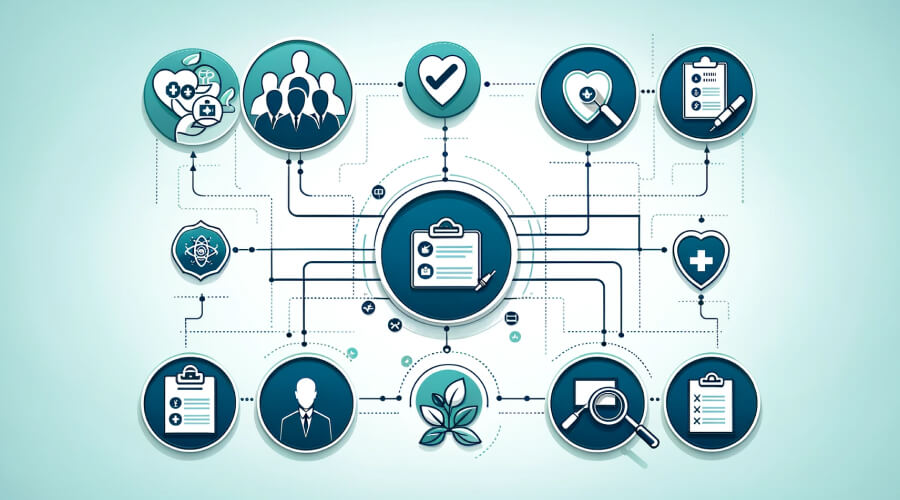
Custom Healthcare software acts as the digital command center at a healthcare organization. It allows management to monitor the various departments in the organization and liaise with colleagues without necessarily meeting face-to-face.
But even more important, players in the healthcare industry are now opting for custom healthcare software development services focused on compliance and innovation. Innovation makes things run more efficiently or helps bring time- and cost-effective solutions, while compliance ensures the organization meets the professional, ethical, and legal standards expected of them.
Importance of Compliance in Healthcare Technology
Compliance ensures patient safety is a priority and plays a big role in curbing bad patient outcomes. Healthcare, ethical, and legal guidelines are set to safeguard the patient’s welfare by:
- Admonishing healthcare professionals to always act in the interests of the patient
- Abide by their profession’s code of conduct
- Protecting the patient against all forms of abuse from healthcare providers
- Securing the patient’s privacy.
Organizations that stay compliant are less likely to be liable for malpractice. Compliance means the organization follows the set clinical standards, follows the best clinical practices, and promptly adapts any changes to clinical guidelines.
Compliance also means the organization abides by the governing rules set by government agencies responsible for overseeing healthcare management at federal and state levels, such as:
- Food and Drug Administration
- Environmental Protection Agency
- Centers for Medicare & Medicaid Services
- Occupational Safety and Health Administration
- Health Resources and Services Administration
- Office for Civil Rights
- Office of Inspector General.
When organizations are compliant, they avoid the fines and sanctions that come with non-compliance. Compliance is the only way to protect themselves from the financial loss and reputational damage resulting from such measures.
Strategies for Ensuring Compliance
Meeting all compliance requirements may seem daunting at first. But only when one doesn’t carve out a solid path to compliance. Getting it right requires group effort, and having compliance specialists helps keep the process straightforward.
Below are some strategies a healthcare organization can adopt to ensure compliance:
Create a Compliance Team
Have a dedicated team that will oversee the creation and implementation of the compliance program. Some organizations establish a complete compliance department. But even without the resources to create a whole department, management can assemble a team of knowledgeable individuals to assess and monitor practices within the organization.
Qualifying individuals should have an academic background in healthcare administration and certifications in healthcare compliance. The team:
- Identifies weaknesses that put the organization at risk of noncompliance.
- Develops programs and measures to ensure the organization complies with all laws and regulations.
- Oversees the implementation of the compliance program.
- Runs a compliance training program for all employees.
Provide Training Facilitation for Employees
Provide the resources needed to train all staff to understand the regulations they should comply with, what’s expected of them, and how to act when they discover compliance gaps or problems.
Employee training is not a one-off undertaking. It should be an annual operation, with training sessions planned between the yearly training dates for new staff. Update the training program to include any changes in policy, standards, practice guidelines, or laws.
Establish An Auditing System
Have an internal and external audit system to check the effectiveness of the facility’s program. Regular monitoring and inspection will help catch any inconsistencies that could put the organization in trouble with compliance regulators.
Design Corrective Action Plans

Develop action plans to correct errors employees report or discover while auditing or monitoring the organization. An effective action plan is timely and easy to implement.
Case Studies of Compliant Healthcare Solutions
The U.S. Department of Health and Human Services (HHS) details case studies on compliant healthcare solutions. Also listed are examples of organizations that were not compliant and the changes they made to attain compliance.
Healthcare organizations can consult the HHS website for practical steps to comply with all regulations.
Future of Compliance in Healthcare Tech
The healthcare compliance field is complex, with regular changes and updates to existing regulations. Healthcare organizations that hope to stay compliant must be up-to-date with all industry happenings and quickly implement the required changes.
Some practices organizations will need to adapt in the future include:
Use of Healthcare Compliance Software
Most healthcare organizations rely on one healthcare software or another for the smooth running of their facilities. An increasing number of operators use custom healthcare software to provide specific solutions, one of which is healthcare compliance software.
Increasing Use of AI and Cloud-Based Solutions
⇒ AI tools enhance compliance by:
- Identifying mistakes quickly
- Analyzing systems and reporting weak links and potential problem areas
- Suggesting solutions for the team to consider.
⇒ Cloud-based solutions provide:
- A central location for authorized staff to access and share files and information
- Easy, location-independent access to files and information
- A cost-effective way for growing companies to scale quickly and safely.
Also Read: Custom Software Solution Reshaping The Digital Signage
Conclusion
The future of healthcare management leans toward custom healthcare software. Compliance is a big part of healthcare provision, and custom healthcare management software is one of the most effective solutions in helping companies comply with government regulations.






